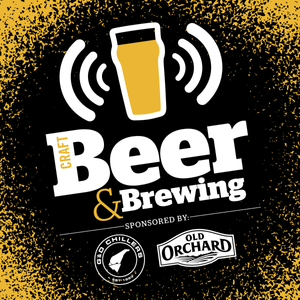
#23: Tasting Authenticity—When Different Countries Have Similar Flavor Profiles
07/28/20 • 51 min
What happens when the best in the world can't tell if a wine comes from the Willamette Valley in Oregon or Burgundy, France? What happens when the experts can't tell if the bubbles are from Champagne or California.
Does a place really have a taste? Can we find it in the glass?
That is the premise of terroir, tasting the land, localizing the product. But often, when put "terroir" to the test it cannot be found.
Today's episode starts with the story of the 1976 Judgement of Paris tasting, a famous part of wine history that pitted French terroir-driven wines against terroir-less California wines. The competition had a blind tasting for red wine and for white wines. The red wines were predominantly Cabernet Sauvignon and the white wines were the Chardonnay variety.
We are also going to see what happens when Terroir is used as a basis for certifications. I'll share with you some of the limitations of the "geographic protectionism" and the Appellation d'Origine Contrôlée (AOC) system.
Certifications are usually protective tools but sometimes they can work against the producers they are meant to protect.
How can such a romantic and noble concept, tasting the land, respecting nature - work against producers?
To pick future podcast topics, get access to the scientific papers, ask questions that I answer on the podcast, and help me continue making episodes: consider supporting the show by Joining Patreon Here
Mentioned on the podcast:
The historical origins are from the book Terroir and Other Myths of Winegrowing by Mark A Matthews.
What happens when the best in the world can't tell if a wine comes from the Willamette Valley in Oregon or Burgundy, France? What happens when the experts can't tell if the bubbles are from Champagne or California.
Does a place really have a taste? Can we find it in the glass?
That is the premise of terroir, tasting the land, localizing the product. But often, when put "terroir" to the test it cannot be found.
Today's episode starts with the story of the 1976 Judgement of Paris tasting, a famous part of wine history that pitted French terroir-driven wines against terroir-less California wines. The competition had a blind tasting for red wine and for white wines. The red wines were predominantly Cabernet Sauvignon and the white wines were the Chardonnay variety.
We are also going to see what happens when Terroir is used as a basis for certifications. I'll share with you some of the limitations of the "geographic protectionism" and the Appellation d'Origine Contrôlée (AOC) system.
Certifications are usually protective tools but sometimes they can work against the producers they are meant to protect.
How can such a romantic and noble concept, tasting the land, respecting nature - work against producers?
To pick future podcast topics, get access to the scientific papers, ask questions that I answer on the podcast, and help me continue making episodes: consider supporting the show by Joining Patreon Here
Mentioned on the podcast:
The historical origins are from the book Terroir and Other Myths of Winegrowing by Mark A Matthews.
Previous Episode

#22: Terroir—Part II: Yeast, Bacteria & Transparent Coffee Processing
Welcome to the next installment of terroir in coffee.
This one little word contains a whole world of history and has an important role in the economic viability of certain agricultural products.
After the last episode I heard from some of you who wished I had talked about soil minerals and plant nutrition from soil. Others also asked about the wine making regions like Bordeaux where Terroir is regulated by french law. I cover both of these concerns in todays episode before we get to discuss what I really wanted the episode to be about: microbes and morality.
There is an unspoken understanding that products that express terroir are more moral than others.
I wanted to give you an episode that focused on microbiology, that talked about the yeast and bacteria that contribute to a "taste of place" but I couldn't do it without including the human perception that products that express terroir, products that are "transparent" are superior.
I think we need to be really careful because science doesn't support this view. Any moral component of terroir is a choice to see it through a religious and political lens.
I want to challenge your views on "transparency" and "intrinsic quality".
To pick future podcast topics, get access to the scientific papers, ask questions that I answer on the podcast, and help me continue making episodes: consider supporting the show by Joining Patreon Here
Mentioned on the podcast:
The historical origins are from the book Terroir and Other Myths of Winegrowing by Mark A Matthews.
Next Episode

#24: Tea and Coffee: Conscious Uncoupling w/ Aurora Prehn
Aurora is back for another tea chat.
Unfortunately I think coffee and tea are often lumped together in similar categories but they have very different histories and I think it’s worth trying to de-couple these beverages.
Join us as we discuss how:
-tea is largely consumed in it's botanical origins and coffee is not.
-the different flavors of stress (positive and negative)
-over extraction and the role of color
-my thoughts on Cascara tea
Mentioned in the Podcast:
Support the show on Patreon and get Aurora's curated tea flights and download the research paper on Leafhoppers and Oriental Beauty oolong tea.
Aurora's Website
Tea Reading List 2020 located at worldcat.org, curated by Aurora PrehnHow to Taste by Becky Selengut
If you like this episode you’ll love
Episode Comments
Generate a badge
Get a badge for your website that links back to this episode
<a href="https://goodpods.com/podcasts/making-coffee-with-lucia-solis-218136/23-tasting-authenticitywhen-different-countries-have-similar-flavor-pr-24702075"> <img src="https://storage.googleapis.com/goodpods-images-bucket/badges/generic-badge-1.svg" alt="listen to #23: tasting authenticity—when different countries have similar flavor profiles on goodpods" style="width: 225px" /> </a>
Copy




